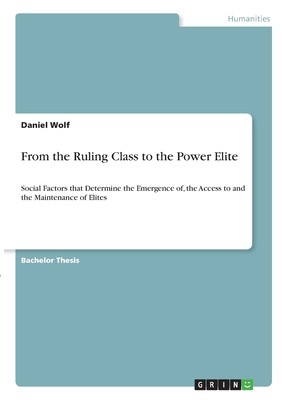
- We will send in 10–14 business days.
- Author: Daniel Wolf
- Publisher: GRIN Verlag
- Year: 2021
- Pages: 34
- ISBN-10: 3346357694
- ISBN-13: 9783346357694
- Format: 14.8 x 21 x 0.2 cm, minkšti viršeliai
- Language: English
- SAVE -10% with code: EXTRA
Reviews
Description
Bachelor Thesis from the year 2020 in the subject Sociology - Political Sociology, Majorities, Minorities, grade: 1,0, University of Tubingen (Institut für Soziologie), language: English, abstract: Does democracy really live up to this norm? Can in fact everyone belong to an elite? To answer this question the author would like to present and critically examine three elite theories that differ in content and time. He is not only concerned with access to the elites, i.e. how they recruit themselves, but in the overall context with how a group of influential and powerful people emerges and how they maintain themselves. His argument is that he believes that access to an elite can be understood much better by examining how they emerge and try to maintain their position in society. The question of social access to the elites, therefore, is always a question of how they emerged and how they are maintained. But the main focus will ultimately be on the question of the access of individuals to elites. In this work he will therefore identify the social factors that determine the emergence of, the access to and the maintenance of elites. Everyone has heard the term "elite" before. But very few know what it means or who exactly it refers to. Defined by the Cambridge Dictionary, the "elite" are "those people or organizations that are considered the best or most powerful compared to others of a similar type". But what makes them "the best" or "most powerful"and how do they get into this privileged position? In our democratic society, it is assumed that education, performance and success are decisive for advancing one to an elite position. Allegedly, anyone can ascend to a privileged elite position. Open access to the elites is one of the central norms of a representative democracy. The author will therefore start with a small historical and theoretical background to the term "elites"itself, since it is often unclear what is meant by elites. Indeed, the term can be used in diff
EXTRA 10 % discount with code: EXTRA
The promotion ends in 22d.23:34:19
The discount code is valid when purchasing from 10 €. Discounts do not stack.
- Author: Daniel Wolf
- Publisher: GRIN Verlag
- Year: 2021
- Pages: 34
- ISBN-10: 3346357694
- ISBN-13: 9783346357694
- Format: 14.8 x 21 x 0.2 cm, minkšti viršeliai
- Language: English English
Bachelor Thesis from the year 2020 in the subject Sociology - Political Sociology, Majorities, Minorities, grade: 1,0, University of Tubingen (Institut für Soziologie), language: English, abstract: Does democracy really live up to this norm? Can in fact everyone belong to an elite? To answer this question the author would like to present and critically examine three elite theories that differ in content and time. He is not only concerned with access to the elites, i.e. how they recruit themselves, but in the overall context with how a group of influential and powerful people emerges and how they maintain themselves. His argument is that he believes that access to an elite can be understood much better by examining how they emerge and try to maintain their position in society. The question of social access to the elites, therefore, is always a question of how they emerged and how they are maintained. But the main focus will ultimately be on the question of the access of individuals to elites. In this work he will therefore identify the social factors that determine the emergence of, the access to and the maintenance of elites. Everyone has heard the term "elite" before. But very few know what it means or who exactly it refers to. Defined by the Cambridge Dictionary, the "elite" are "those people or organizations that are considered the best or most powerful compared to others of a similar type". But what makes them "the best" or "most powerful"and how do they get into this privileged position? In our democratic society, it is assumed that education, performance and success are decisive for advancing one to an elite position. Allegedly, anyone can ascend to a privileged elite position. Open access to the elites is one of the central norms of a representative democracy. The author will therefore start with a small historical and theoretical background to the term "elites"itself, since it is often unclear what is meant by elites. Indeed, the term can be used in diff


Reviews